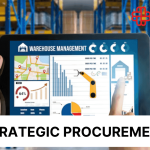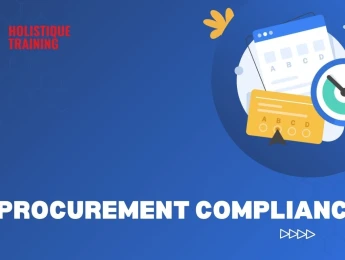Strategic procurement practices are essential for organisations seeking to optimise their supply chain and enhance overall operational efficiency.
This approach involves a holistic and forward-thinking strategy in sourcing goods and services to meet organisational objectives. Effective strategic procurement goes beyond mere cost considerations; it involves assessing supplier capabilities, fostering long-term partnerships, and mitigating risks in the supply chain.
This practice encompasses market analysis, supplier segmentation, and implementing technology-driven solutions for streamlined procurement processes. By aligning procurement with broader organisational goals, businesses can leverage their purchasing power, negotiate favourable contracts, and drive innovation in the supply chain. Strategic procurement practices contribute to cost savings and enhance resilience, agility, and competitiveness in a dynamic business environment.
Upon completion of this course, participants will be able to:
- Understand the significance of strategic procurement and its alignment with corporate strategy.
- Effectively oversee suppliers, encompassing selection, relationship cultivation, performance enhancement, and risk mitigation.
- Implement strategic sourcing and category management principles within procurement processes.
- Demonstrate proficiency in negotiation and contract management within the procurement domain.
- Stay informed about upcoming trends in strategic procurement, such as digitalisation and sustainability, and develop a comprehensive strategic procurement plan.
This course is designed for anyone responsible for managing procurement relationships or creating an effective and profitable supply chain. It would be most beneficial for:
- Procurement Managers
- Business Owners
- Supply Chain Managers
- Project Managers
- Financial Managers
- Executives
- Procurement Professionals
- Risk Assessors
- Business Consultants
- Business Relationship Managers
This course uses a variety of adult learning styles to aid full understanding and comprehension. Participants will view trainer-led presentations to understand all elements of an effective procurement department and the essential skills required to maintain an effective and profitable supply chain.
They will work in groups to conduct role-playing activities to enhance their negotiation skills to secure high-end contracts and undergo scenario training to help them keep stakeholders on the side when an issue occurs. They will have the opportunity to review real-world case studies to understand the impacts of mutually beneficial procurement relationships and help them select the best suppliers for their future organisations.
Day 5 of each course is reserved for a Q&A session, which may occur off-site. For 10-day courses, this also applies to day 10
Section 1: How Important is Strategic Recruitment to the Business?
- Identifying key talent acquisition strategies.
- Aligning recruitment with organisational goals.
- Building employer branding for strategic hiring.
- Leveraging technology in the recruitment process.
- Effective use of social media for talent acquisition.
- Diversity and inclusion in strategic recruitment.
- Employee retention as a strategic recruitment outcome.
- Adapting to market trends in recruitment.
- Measuring and evaluating recruitment success.
- Legal and ethical considerations in strategic hiring.
- Continuous improvement in recruitment strategies.
Section 2: Building Effective Supplier Relationships
- Understanding supplier dynamics.
- Implementing collaborative supply chain practices.
- Risk management in supplier relationships.
- Supplier performance metrics and evaluation.
- Contractual agreements and legal considerations.
- Ethical sourcing and corporate responsibility.
- Leveraging technology for efficient supplier management.
Section 3: Product Sourcing & Category Management
- Strategic approaches to sourcing.
- Supplier selection and evaluation.
- Principles of category management.
- Market analysis and demand forecasting.
- Effective negotiation strategies.
- Contract management in sourcing.
- Supply chain optimization techniques.
- Technology applications in category management.
- Sustainability considerations in sourcing.
- Risk management in supply chain categories.
- Performance metrics and key performance indicators (KPIs).
- Adapting to market trends in sourcing.
Section 4: Negotiation & Communication Skills
- Communication strategies with suppliers.
- Negotiation skills for successful partnerships.
- Essential principles of effective negotiation.
- Strategic communication strategies.
- Building trust and rapport in negotiations.
- Active listening and questioning techniques.
- Non-verbal communication mastery in negotiations.
- Tactical preparation for successful negotiations.
- Conflict resolution and managing difficult situations.
- Achieving mutually beneficial outcomes.
- Ethical considerations in negotiation practices.
- Negotiating across diverse cultural contexts.
- Leveraging technology in communication and negotiation.
- Tailoring communication to various stakeholders.
- Optimising negotiation team dynamics.
Section 5: Future Trending Analysis of Procurement Practices
- Technological advancements impacting procurement.
- Sustainability and green procurement practices.
- Digitalization of procurement processes.
- Strategies for supplier diversification.
- Agile methodologies in procurement.
- Data analytics and predictive procurement.
- Globalisation and international procurement trends.
- Ethical and social procurement strategies.
- Risk management in future procurement.
- Industry 4.0's influence on procurement.
- Innovations in procurement technology.
- Building resilience and adaptability in procurement.
Upon successful completion of this training course, delegates will be awarded a Holistique Training Certificate of Completion. For those who attend and complete the online training course, a Holistique Training e-Certificate will be provided.
Holistique Training Certificates are accredited by the British Assessment Council (BAC) and The CPD Certification Service (CPD), and are certified under ISO 9001, ISO 21001, and ISO 29993 standards.
CPD credits for this course are granted by our Certificates and will be reflected on the Holistique Training Certificate of Completion. In accordance with the standards of The CPD Certification Service, one CPD credit is awarded per hour of course attendance. A maximum of 50 CPD credits can be claimed for any single course we currently offer.
- Course Code PO1-132
- Course Format Classroom, Online,
- Duration 10 days













